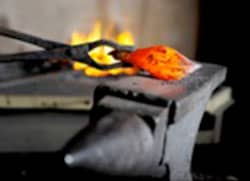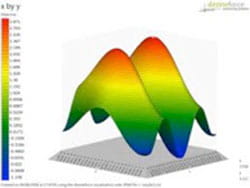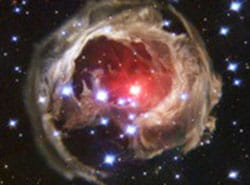If my title seems nonsensical, a definition is in order. I am an engineer, trained in empirical science, which means, among other things, that I know how to conduct experiments in an efficient manner; in my case, that means building empirical experiments in optimization.
Please don't run away. All of that—like the title—sounds harder than it is to understand. Metaphysics is, well, metaphysics. Annealing is a metallurgical process where the microstructure of the metal is erased by high temperatures, so it can be remolded into another form. This is when a blacksmith heats up metal to a high heat (popularly, to a "red heat").
Beating is optional, as a microstructure will develop in any event, and quenching—casting the beaten iron into water with a hiss—halts the growth process. If you stay with me, we're going to move from the metallurgical concept to the empirical concept, and then use both to expand upon an analogy of God and suffering, or, the metaphysical concept.
 Long before we could see microstructure, blacksmiths knew how to manipulate it. They learned, through trial and error, that heated metal did different things than cold metal, and that it was a lot easier to change the structure of a metal if it were hot. Thus, creating a barrel hoop, or wagon wheel, is easier if you can heat the metal first. The scientific reason for this is that (most) metals are crystalline. Therefore what might look like a solid bar of iron is actually made up of multiple crystals, and the boundaries between those crystals create barriers to working the metal. Annealing "melts" the different crystals together and removes those barriers.
Long before we could see microstructure, blacksmiths knew how to manipulate it. They learned, through trial and error, that heated metal did different things than cold metal, and that it was a lot easier to change the structure of a metal if it were hot. Thus, creating a barrel hoop, or wagon wheel, is easier if you can heat the metal first. The scientific reason for this is that (most) metals are crystalline. Therefore what might look like a solid bar of iron is actually made up of multiple crystals, and the boundaries between those crystals create barriers to working the metal. Annealing "melts" the different crystals together and removes those barriers.
Interesting, right? I promised you a move to empiricism, and we're headed there now. But if this starts to sound too geeky, remember that all of this is back-loading that will bring us to some pretty interesting God-talk. So here we go: My own work centers on the question of optimization. How do you optimize something?
First, this requires a definition of the optimum. In my field, typical optima definitions are "maximal profit," "minimal cost," and "highest customer satisfaction." Optima are, by their nature, superlative.
The phrase "finding the optimum" necessarily implies a search, and that is one of the primary questions of empirical science: efficient searching mechanisms. Specifically, we want to search the "space" of possible solutions for that optimum. In the case of a problem that can be cast in three dimensions, this space can be seen as a surface or even landscape, and the optimum as the highest point on the surface.
 Now, there are techniques for finding the absolute best solution (called "the global optimum"), but many techniques are sometimes fooled into thinking one "high point" is in fact the "highest point." (In the picture above, some techniques may say the peak on the left is the global optimum, when the peak on the right actually is.) High points that are not the highest are called "local optima."
Now, there are techniques for finding the absolute best solution (called "the global optimum"), but many techniques are sometimes fooled into thinking one "high point" is in fact the "highest point." (In the picture above, some techniques may say the peak on the left is the global optimum, when the peak on the right actually is.) High points that are not the highest are called "local optima."
So, how do we get around this issue of mistaking local optima (our will, our ideas) for the global optimum of God's will, God's ideas? One technique is called simulated annealing, and it works as an analogy to metallurgical annealing. Basically, it boils down to "heating" the solution so that the search mechanism doesn't get "stuck" as easily on local optima.
If you're wondering why we're using scientific analogies to explore religious concepts, "blame" Leah Libresco. Leah writes a blog here at Patheos called Unequally Yoked. She wrote in 2010—and I read, last week—"Instead of a utopia, we require a crucible."
This immediately pulled together my knowledge of annealing and simulated annealing and processed it into "like gold that's tested in fire."
And thus was born full-formed, like Pallas Athena, the notion of Metaphysical Annealing.
Here comes the suffering and God part.
Consider, first, that we are all on a metaphysical search for purpose. Since we are on a search, and that search is for an optimum, the mechanisms of empirical science and optimization I've explained above apply in full.
 What space are we searching? The infinite possibilities of experience. Not just the universe, but the entire chain of experience that has created the moment where I'm typing this, and all the universes that can possible lead from this moment into eternity.
What space are we searching? The infinite possibilities of experience. Not just the universe, but the entire chain of experience that has created the moment where I'm typing this, and all the universes that can possible lead from this moment into eternity.



